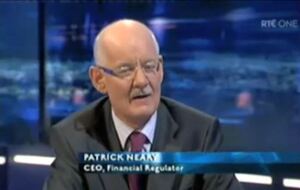The moment when everyone knew.
CEO of the Financial Regulator Patrick Neary with a tenacious Mark Little on RTÉ’s Prime Time back in October 2008, in the wake of the bank guarantee.
Mark Little: “You said, September 19, ‘Irish banks are resilient and have good shock absorption capacity to cope with the current situation’. Do you regret making that statement now?”
Patrick Neary: “Absolutely not. I think the issue that was facing the Government this week is connected with the supply of liquidity in the financial markets. It’s very important for all members of the public that they have access to cash. Banks are sources of information for members of the public. You need cash to go about your daily, daily lives, for the economy to function properly. The supply of cash in the international markets has been drying up for a number of months. But the world changed, a couple of weeks ago, with the collapse of Lehman Brothers. I think, after that, there was great nervousness in the international financial markets. We saw flight to quality, we saw banks unwilling to lend to each other. We saw banks, preferring to deposit with the European Central Bank, the Bank of England, the Fed, anywhere but lend to each other. And that affected the Irish bank…(vid goes silent)..cash, to supply cash to the economy and that was the great worry.”
Little: “Isn’t that just, at the very most, only a partial reality? The reality is a fundamental weakness in the Irish banking sector. And that’s an exposure to a crumbling property market?”
Neary: “Completely different issues altogether. The issue facing us today…”
Little: “Is that not the source of the potential collapse of banks here?”
Neary: “I don’t accept that at all. We’ll come to that in a minute and we’ll talk about the activities of banks. But let me say, the issue that was facing the Government. And I have to say the prompt response of the Government was addressing a very serious…(vid goes silent)..”
Little: “They had no confidence in the Irish banks and the reason was that they had lent recklessly in a crumbling property market.”
Neary: “We’ll deal with the lending in a moment.”
Little: “No, no, I’m just asking you a question. That’s what the market said. Do you not recognise there was a fundamental weakness in the banking sector, aside from global conditions.”
Neary: “I just want to first of all address the issue that faces us today.”
Little: “No you’ve already explained that. My question to you is.”
Neary: “All right, let’s move on.”
Little: “Do you accept there is a fundamental weakness in the Irish banking sector and that’s its overexposure to the property market?”
Neary: “I do not accept that at all. These issues are totally unrelated. The issues of lending, the loan portfolios, the risks in the loan portfolios are addressed by having appropriate levels of capital in place. And, in fact, the regulator has been very active since 2006 in putting these measures in place.”
Little: “Why didn’t you stop the kind of behaviour that was described in Una’s (RTE reporter) report earlier. Why didn’t you stop, for example, people getting loans seven times their salary? 95% mortgages? Why didn’t you stop that behaviour?”
Neary: “The important thing to make sure that the banks are adequately able to deal with the challenges that may emerge as the economy weakens is that they have adequate levels of capital to absorb any losses.”
Little: “Let me ask you about the issue of how exposed the banks are. Now they have over a €100billion outstanding loans to property developers and builders. How much of that are they going to get back?”
Neary: “I believe there will be certain impairments over the next couple of years, as the economy declines.”
Little: “What are we talking? Are we talking about 5, 10, 15, 20billion in bad loans?”
Neary: “You can’t speculate about that.”
Little: “So how can you say the banking system is sound if you don’t know the level of bad loans.”
Neary: “The important thing is that difficulties emerge in a loan portfolio. In the normal course of the life of that loan portfolio, that’s what they…”
Talk over each other.
Neary: “That’s what, that is our day job. Our day job is…”
Little: “The taxpayer now has a potential liability. I’m asking you now about the solvency of the banks.”
Neary: “Yes.”
Little: “What is the estimate? Your estimate of bad loans for the banks going forward?”
Neary: “You could not speculate on that. The important thing…”
Little: “So how can you say that the banks are financially sound?”
Neary: “The important thing is that risks emerge over the lifetime of the loan portfolio and it is important that there is adequate capital there, to absorb those risks and by any estimate, the Irish banks are so well capitalised compared to any banks anywhere, across Europe. That I am confident that they can absorb any loans or any impairments that emerge in the ordinary course of business over the foreseeable future.”
Little: “Let me take you back to a couple of years ago. You were expressing concerns, as I say, about these risky loans, about people getting loans six, seven times their salary. Why didn’t you stop it?”
Neary: “I most certainly did take very decisive action because at time, two years ago, when we were…”
Little: “Did you stop that behaviour?”
Neary: “You must absolutely provide choice to customers and customers must be able to make decisions, informed decisions and have these choices open to them. Our job is to assess the risks and to make sure that the system is able to absorb those risks, which I think the measures, we introduced back in 2006, did.”
Little: “So you don’t accept that the banks took any risks before this crisis?”
Neary: “The banks. It is part of banking that they do take risks.
Little: “Unnecessary?”
Neary: “And it is absolutely part of banking supervision and regulation, that banks are able to absorb the effects of those risks and I believe the Irish banks are adequately, more than adequately capitalised, and they’re very resilient and they will be able to absorb these risks.”
Little: “Ok, you’ve said that before. Let me move on to this guarantee. This guarantee gives incentive to banks to continue whatever risky behaviour they want because the taxpayer is going to foot the bill eventually, if anything goes wrong, right?”
Neary: “We’re in an absolutely different environment now. This guarantee has brought a new world. It’s a completely different situation. The taxpayer is there, since the Government initiative, the taxpayer is there to guarantee the banks and the idea behind that is…”
Little: “My question to you is: what are you going to do to stop risky behaviour in the banking sector? For example, will you stop dividends being paid out to shareholders?”
Neary: “The Government will, and has, sought the advice of the regulator and the Central Bank as to what the regulatory framework should be, to ensure greater accountability and transparency…”
Little: “Is that a yes or a no?”
Neary: “For the taxpayer. And we are working on what the regulatory response should be and, in fact, as we speak we have people in the office. They’ve been working through the weekend..”
Little: “I’m not sure about the answer to that question. Will you do anything to stop..”
Neary: “To make sure the Government gets the appropriate advice so that the taxpayer can be reassured so that the measures and…”
Little: “Ok.”
Neary: “And the scheme put in place, under the Act, gives assurance to the taxpayer that…”
Little: “Ok, Pat Neary, is it moral, for banking executive, chief executives, to be getting multi-million dollar, multi-billion euro pay and bonuses at a time when the taxpayer is taking the risk for potential problems.”
Neary: “Certainly that is an area, executive pay, that will be considered as part of the requirements going forward. And it’s one of the areas that will be looked at and it will be included in the advice that we give to the minister next week…”
Little: “But the question is what have..(inaudible) Don’t worry about the regulatory framework. They (the public) want to know about the morality.”
Neary: “I think people out there want to hear me saying tonight is: that their money is safe and that there is adequate liquidity in the system for them to go about their daily lives, to be able to meet their daily obligations, for businesses to have liquidity available to them. That is the important message and that is what the Government has delivered through this initiative that soundness and safety of people’s deposits and that they can do their business.”
We were doomed.





